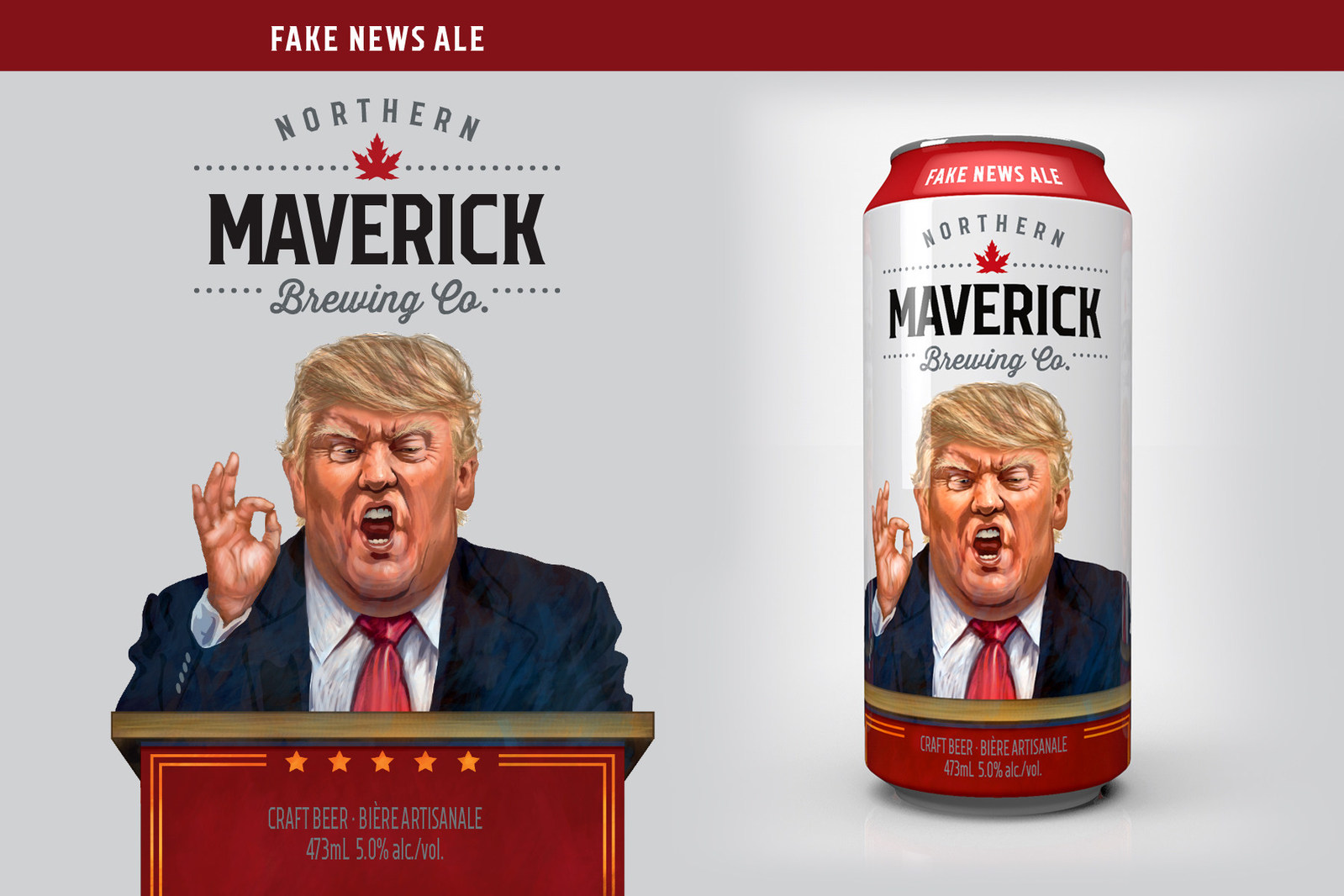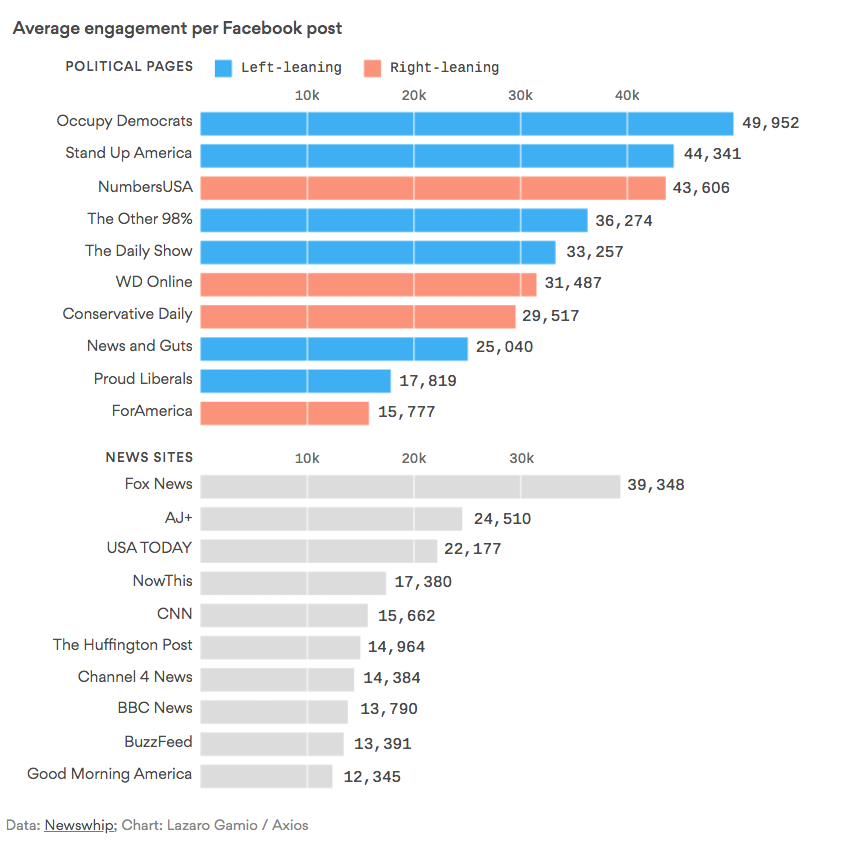
The growing stream of reporting on and data about fake news, misinformation, partisan content, and news literacy is hard to keep up with. This weekly roundup offers the highlights of what you might have missed.
What if social media isn’t actually the problem? “The growth in polarization in recent years is largest for the demographic groups least likely to use the internet and social media.” That’s the main finding of a working paper published last month by researchers from Brown and Stanford for the National Bureau of Economic Research and written up this week by Vox.com’s Ezra Klein. Klein:
Matthew Gentzkow, one of the paper’s coauthors (we interviewed him a few years back on how the Internet hasn’t changed news as much as we think), told Klein he has “two main hypotheses” for why polarization is increasing among older Americans. “One is stuff that has nothing to do with media at all but is structural, like increasing income inequality. The second is non-digital media, and cable TV and talk radio in particular.” As Klein notes, “More than a third of talk radio listeners are over age 65, and half of Fox News’s audience is over age 68.” That said, as Emily Bell points out, the paper’s data extends only to 2012, and Facebook five years ago feels like an entirely different world than Facebook today.Does this mean the internet isn’t making us more polarized? Not necessarily. The young are becoming more polarized, and it’s possible social media is part of the reason. But given that older Americans who don’t use social media are polarizing faster than younger Americans who do, it’s clear that this is about more than whom you follow on Twitter.
Indeed, some of the people freaking out about fake news seem to watch a lot of cable. CJR’s Jonathan Peters FOIA’ed the FCC asking for all consumer complaints filed since October 1, 2016, that included the phrase “fake news.” He received 40. “19 addressed the mainstream media’s reporting as a whole, or focused on that of a supposedly left-leaning outlet, such as CNN or MSNBC. Five others addressed Fox News’ reporting. The rest ran the gamut, and included complaints about the National Enquirer’s presence at supermarket checkouts and the urgent need for the FCC to ‘drain’ Facebook’s ‘swamp.'” Here are two of the responses:
Fox should be required to issue retractions for every single fake “news” item. Additionally, Fox should be required to dismiss each and every single person who created fake “news,” and fine the network appropriately. Next, Fox should be required to hire an independent agent who will review news items for truth and accuracy and has option to cancel news article. Finally, Fox will be placed on warning that should any further broadcast of fake “news” without immediate retraction or correction will result in the revocation of their license to operate.
The Mainstream Media news outlets are obviously trying to undermine our President and our nation by inundating the public with fake news, misleading stories, and one-sided biased interviews and spokespeople. It is most apparent on CNN, MSNBC, ABC, CBS, NBC, and PBS, but also print media like the New York Times and Washington Post. For the sake of our nation, I hope you will get them to develop a balanced and unbiased approach to the news they report.
It’s too bad this beer is sold only in Canada. You’ll be the hit of your newsroom’s next gathering when you pull out a sixer of Fake News Ale, a new offering from Toronto craft brewery Northern Maverick.
“Direct delivery” will be available in mid-June, Northern Maverick says (not sure if this means hot beer sent through the mail), and the beer will also be at Northern Maverick’s brewery and restaurant, opening in Toronto this summer.
Is it good? Does it matter?
Facebook’s early efforts to combat fake news are boring. The Ringer’s Alyssa Bereznak on the dutiful list of fake-news-spotting tips that’s recently begun appearing at the top of some users’ feeds: “It was as if the same tech platform that, for years, has been inventing features like autoplay video, livecasting, and colorful blocky text to improve engagement was suddenly bitter about completing an obligatory homework assignment, and wanted to make its users suffer for it, too.” It’s early, but Facebook hasn’t really shared anything about the efficacy of these efforts, even as it makes “continual announcements” about them.
Facebook is running these same tips as an ad campaign in German newspapers, reports Bloomberg’s Stefan Nicola. They do look a little less boring in print, what with the purple and all:
Facebook informiert im Handelsblatt ganzseitig darüber, wie man Falschmeldungen erkennt. Überlege noch, wie ich das finde… pic.twitter.com/vJC17re4zb
— Ann Cathrin (@anncathrin87) April 13, 2017
The left is rising on Facebook. I’ll out-bullet Axios by sharing just this chart from their post:

Fake news and fabricated sources aren’t the same thing. A thing I’ve hoped to do in writing this column is get closer to a working definition of fake news, one that would somehow make everything make sense. I haven’t gotten there yet, but I have seen an ever-expanding circle of stuff that gets categorized as “fake news” when we used to call it something else. This week, in a Rolling Stone story titled “The Fake News Story No One’s Talking About,” Jim Rich looks into the case of Kevin Deutsch, a reporter who has been accused of fabricating sources for his recent book (something Deutsch denies) as well as in a number of news stories he reported for outlets like The New York Times.
I don’t think the longtime problem of fabricating sources should be conflated with fake news. Nor does Jonathan Schreiber, president of Glenn Beck’s Mercury Radio Arts, who told Rolling Stone’s Rich: “The bigger issue with fake news is the lack of an accepted definition of fake news. There are at least five examples of what is called fake news, but they aren’t the same thing…Journalists and non-journalists have been making up sources since the dawn of time. Then there are the people who are picking data sources that are wrong, from their side, not on purpose.” And then there’s stuff like this. But “fake news” is increasingly being used to mean “all the problems with journalism now,” a term co-opted by both the left and right, as you can see in those comments to the FCC.